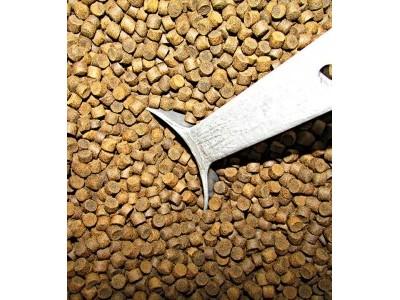Shift in farmed fish feed may impact nutritional benefits

The aquaculture industry is increasing its use of plant-based ingredients in its feed and moving away from traditional feed made from fish, which could impact some of the health benefits of eating certain types of seafood, suggests a new analysis.
The findings, from the Johns Hopkins Center for a Livable Future (CLF) at the Johns Hopkins Bloomberg School of Public Health, were published March 11 in the journal Environment International.
Twice as much soybean meal was used in commercial aquaculture feed in 2008 as compared to fishmeal, and the use of crop-based ingredients is projected to increase 124 percent between 2008 and 2020.
“Farmed fish get their health-promoting omega-3 fatty acids, EPA and DHA, from their feed, and specifically from fish oil,” said study leader Jillian Fry, director of CLF’s Public Health and Sustainable Aquaculture Project and a faculty member at the Bloomberg School, in a release.
“Our review found that increasing plant-based ingredients can change the fatty acid content in farmed fish, which can affect human nutrition,” she said.
The new study details the industry shift to crop-based feed ingredients, such as soy, corn, and wheat, to replace wild fish as a key ingredient in manufactured feed.
The researchers - in collaboration with the University of Minnesota’s Institute on the Environment and McGill University -- reviewed aquaculture and public health literature, and conducted a new analysis to estimate the environmental footprint for the top five crops used in commercial aquaculture feed.
Using vegetable oils instead of fish oil changes the fatty acid content of fish and nutritional value for human consumption, the researchers say.
Considering Americans are encouraged to consume seafood high in omega-3 fatty acids, which promote improved cardiovascular health and neurodevelopment, this has large implications for dietary recommendations and the aquaculture industry.
More research is needed, they say, to better understand the impact of this shift in feed on the health benefits of consuming farmed fish.
While fish-based ingredients are seen as acutely limited, so are the resources such as land, water and fertilizer used to produce feed crops.
Aquaculture’s environmental footprint likely now includes increased nutrient and pesticide runoff from the industrial crop production needed to supply fish food, according to the researchers.
“This runoff is a key driver of water pollution globally, and can negatively impact public health. Depending on where and how feed crops are produced, plant-based fish feed could be indirectly linked to negative health outcomes for agricultural workers and nearby communities due to exposure to air, water or soil contaminated by nutrients and/or pesticides,” they state.
These new findings may raise more questions than they answer, Fry said.
“The nutritional content of farmed fish should be monitored,” Fry said. “The aquaculture industry should assess the environmental footprint and public health impacts of their crop-based feed ingredients and seek those produced using sustainable methods.”
Related news
 In Canada, salmon farmers building social license with First Nations
In Canada, salmon farmers building social license with First Nations Companies like Grieg and Marine Harvest are finding harmony with several native communities.
 Biomass density affects bass production
Biomass density affects bass production In RAS, feed conversion, growth rates not impacted. Biomass density affects bass production. Arkansas is the leading producer of food-size
 Increased density improves grouper feeding response, growth
Increased density improves grouper feeding response, growth Provided that optimum water quality parameters are maintained, white grouper can be a suitable candidate for intensive farming systems.